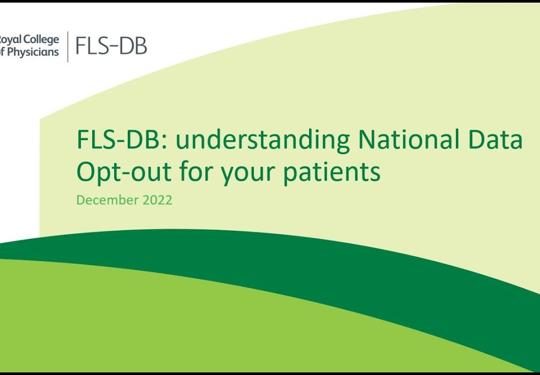The FLS-DB was not granted exemption from the national data opt-out.
We recognise that the introduction of the national data opt-out (NDOO) adds an extra step to participation with the Fracture Liaison Service Database (FLS-DB). This is especially challenging given the current pressures within the NHS. However, the FLS-DB does provide an invaluable real time assessment of the performance of your FLS to highlight areas of good and less good performance and measure the impact of changes to the FLS pathways. The success of the FLS-DB depends on good local participation.
How to keep participating with the FLS-DB
The FLS-DB has always been careful to minimise the data entry burden for sites and maximise the value of participation. Therefore we have prepared a number of straightforward solutions for you to use below.
Why is the FLS-DB not exempt from the NDOO?
With data protection regulations, we all have a choice as to whether we want our confidential NHS information to be shared without our permission. Previously, the secretary of state for health and social care assigned an exemption based on need using a section 251 approval. However, the threshold for this has increased and now each audit must demonstrate how not having an exemption would affect data loss, delivery of direct care and data entry burden.
A major factor is the impact of the level of NDOO on the audit outcomes. The Confidential Advisory Group noted that the FLS-DB average case ascertainment was 43%. This means that missing an additional 6% of cases would not lead to exceptional harm to patient safety: ‘as the case ascertainment is so low, the arguments that the application of NDO will make a sufficiently great difference to patient safety to justify overriding the patients' expressed wish to opt-out of the use of their data is not made’. In comparison, the National Hip Fracture Database (NHFD) has nearly 100% case ascertainment and so was granted NDO exemption. The team at FLS-DB has already made an unsuccessful appeal.
We hope to support you further through our resources and live support sessions. Please get in touch if you have any questions or feedback by emailing flsdb@rcp.ac.uk.
Services should follow the guidance set out by NHS Digital. To comply with the national data opt-out policy, services should put procedures in place to review uses or disclosures of confidential patient information against the operational policy guidance, and check a patient’s opt-out status before entering their details onto the FLS-DB.





